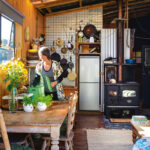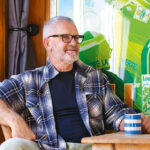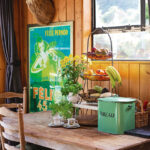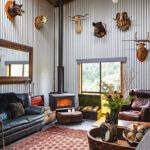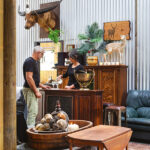A rustic bush hut near Whangamōmona inspires a couple to slow down and be mindful
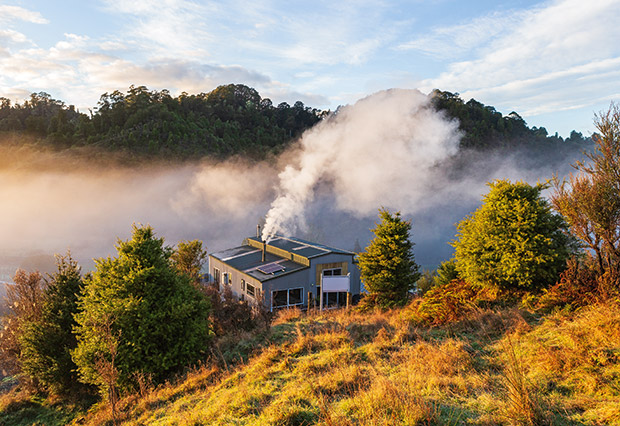
A backcountry hut along the Forgotten World Highway is a befitting backdrop for this city-eschewing couple.
Words: Cari Johnson Photos: Jane Dove Juneau
If trees could talk, mānuka and tōtara would likely chatter each time a dust-coated 2020 Land Cruiser 70 trundled up the hill. After all, visitors besides goats and deer are rare on this sliver of a backcountry road just off the Forgotten World Highway, somewhere between Stratford and Whangamōmona. And the visitors who pause and listen to the forest? Even rarer.
The trees would agree that Michael Drought and Kerry Kelly-Drought are rare sorts, indeed. The couple, who reside in Ōakura, find solace in silence at their off-grid hut. There’s a quietness to the surrounding 202 hectares of regenerating bush that seeps into bones and gently hugs the soul. “We started noticing how good we felt not being in a city — to be surrounded by the bush,” says Kerry.
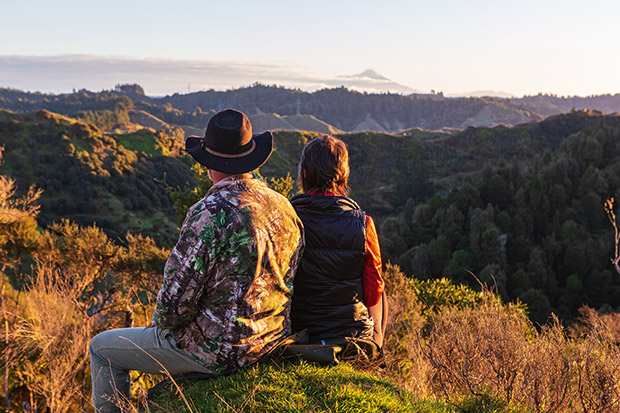
Although Michael Drought and his wife Kerry Kelly-Drought live in Ōakura, Taranaki, they drive two hours (just under) to their bush block near Whangamōmona most weekends. The couple uses the grassy ridgeline as a vantage point to spot wildlife and their resident mountain, Mount Taranaki, which pokes out of the horizon.
Seven years ago, the entrepreneurial pair — he a dairy farmer and she a mortgage broker — began to slow down. To be fair, the small tin shed that came with the land practically demanded it. It still does.
Even after Kerry and Michael rolled up their sleeves to add “luxuries” to the now-144-square-metre hut (including a flushing toilet, a coal range, and a bunk room for their nine grandchildren), the dwelling continues to demand simplicity.
There’s no internet and unreliable cell reception. Perishables are packed in chilly bins. “Life slows down when we’re off-grid in the bush,” says Michael. “It makes us stop and enjoy the environment. Filling up the bathtubs, gathering firewood, heating the coal range — everything takes longer here.”
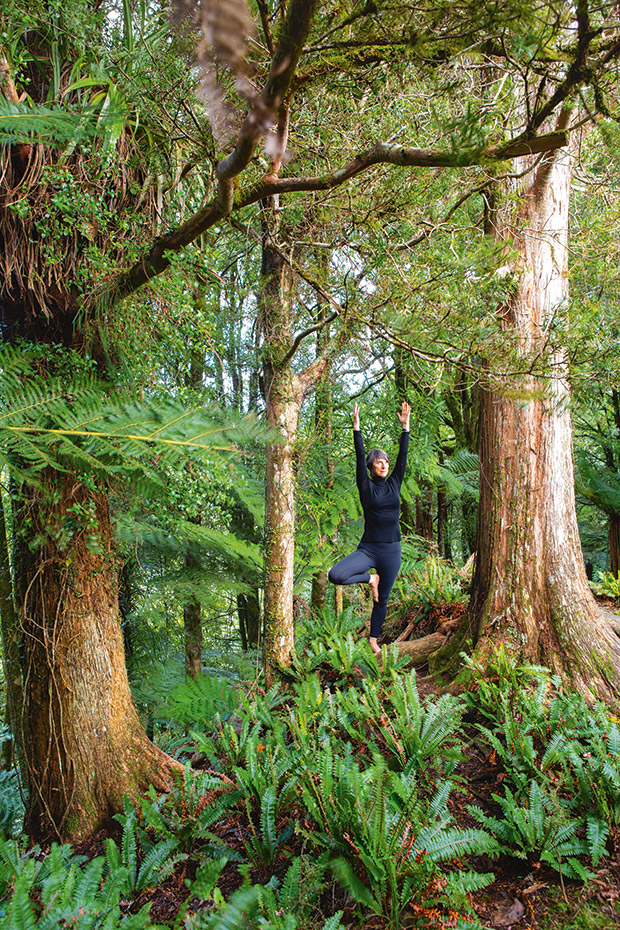
Kerry practises yoga and meditation every morning regardless of her surroundings. This mind-body connection has taught her to notice her surroundings with the wonder of a child. “When you’re busy, you forget to stop and notice things. Michael and I love living playfully, which keeps us feeling young from within.”
Buying the patchwork block of bush-covered backcountry was a no-brainer for Michael, a third-generation farmer from Ōpunake who has spent his entire life outdoors.
On the southwest foothills of Mount Taranaki, his boyhood was spent catching trout and playing sport instead of doing his homework. This was a child who could shoot a wild goat or hare well before his first legal sip of beer. Michael chuckles: “It’s just what we did.”
The land is inextricably in his blood. But listening to the land — genuinely listening? That pastime he credits to his wife. Kerry, born and bred in New Plymouth, has always been spiritual, though her spirituality didn’t extend beyond her mum’s oracle cards until, in her mid-40s, she began suffering from anxiety. One yoga class later, she found her mind-body anchor.
- Little was purchased for the décor and expansion of Michael and Kerry’s bush hut — the coal range was an exception. Macrocarpa timber and aluminium windows were among the motley line-up of items Michael dug out of storage for the renovation. “I don’t throw too much away,” he says. “I’ll just build another shed to store things.”
- The hut is decorated with antiques, heirlooms, and knick-knacks the couple has collected over the years. “Everything has come from one of our homes — there is a memory attached to each piece,” says Kerry.
“I suppose my anxiety came from internalizing people’s problems, so I had to learn to be present and not take on other people’s struggles as my own,” she says. “Yoga allowed me to be my happiest, truest self.” Spending hours in restorative poses takes a lot of persistence, not to mention the strength of the mind.
After three months of daily yoga, Kerry rewarded herself with a month in Bali for yoga-teacher training and a raw-food course. “That really prompted this journey of looking after myself — to treat me like a best friend. I started looking after myself inside and out,” she says.
Building a rustic retreat in the forest couldn’t have come at a more perfect time. Bit by bit, Kerry began to slow down. Eat more whole foods. Meditate in the woods.
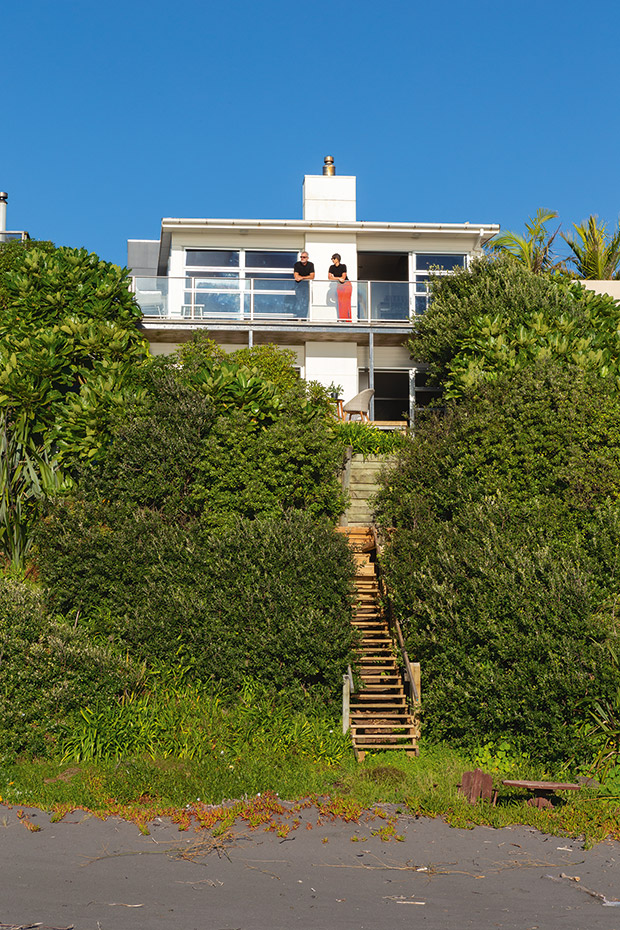
It took two noise complaints for Kerry and Michael to scrap their renovation plans for a property they owned in New Plymouth. Instead of moving from Ōpunake to the city, they settled into this beachfront home in Ōakura. “You can make as much noise as you like in the country. A noise complaint for playing the guitar indoors at 9.30pm? We thought, ‘Nah,” says Michael.
Michael may have grumbled initially, but he too began to make small changes towards a more present life. (He’ll now enthusiastically eat a turmeric-spiced cauliflower “steak”.)
And that’s how Kerry convinced her husband, a Taranaki farmer to the bone, to roll out a yoga mat and mindfully breathe his way through a downward dog pose. Their philosophy on eating — and for Michael, hunting — has changed dramatically since.
Says Michael: “I can get venison from our bush block, but it’s no longer just about the shooting. That’s pretty much where all our meat comes from now. My friends are all ‘Let’s have a shootout,’ and I’m like, ‘No, the bush isn’t about that anymore.’
- Before the shed was lined with steel and insulation, the couple and guests all slept in the lounge for warmth. “It was freezing, and we only had one little fireplace,” says Kerry.
- Most of the animal heads mounted in the hut were gifted by former hunters and taxidermists, except for one or two that Michael shot himself. Kerry has names for all the taxidermy animals, for example, “Cherry” is the water buffalo above the bar.
- The kava bowl filled with baubles was bought by Michael while holidaying in Fiji in the 1990s. Kerry filled it with an assortment of items, ranging from feathered trinkets to glass orbs.
“We’re not vegetarians, but we call ourselves flexitarians. We’re going back to a predominantly plant-based diet, like how I grew up when most vegetables and meat came off the farm. Kerry and I are at a point in our life where we are embracing alternatives.”
Wait, a livestock farmer mainly eating vegetables? Sure, he says. Michael, the owner of several dairy and beef farms around Taranaki, likens his flexible diet to the future of farming: “As a farmer, you have to be open-minded to change. If you don’t stay flexible, you won’t be in business for long.”
Perhaps, this receptivity is what eventually brought the pair together, though it took a few decades and international moves to happen.
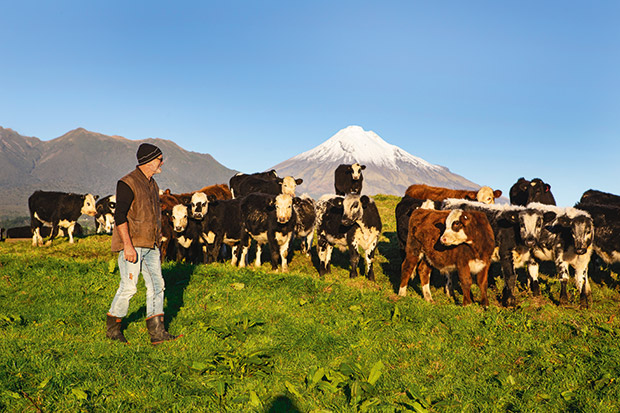
Farming in Britain exposed Michael to farming practices he’d never before witnessed, such as keeping cows indoors for part or all of the year. “It made me realize what I didn’t want to do — and how good it is to farm outdoors.”
In the late 1980s, Kerry moved to London and made her mark in real estate at a young age. At 23, she had sold a home to Welsh actor Catherine Zeta-Jones and was named top real estate salesperson in England.
Seven years later, she returned to Aotearoa and embarked on a new career in sales and marketing, leading to a job as front-of-house event and marketing manager at Trinity Hill Winery in Hawke’s Bay.
Coincidentally, there were a few years when their paths could have crossed in England. Until the 1990s, Michael’s whole life revolved around the dairy farm and raising his three children.
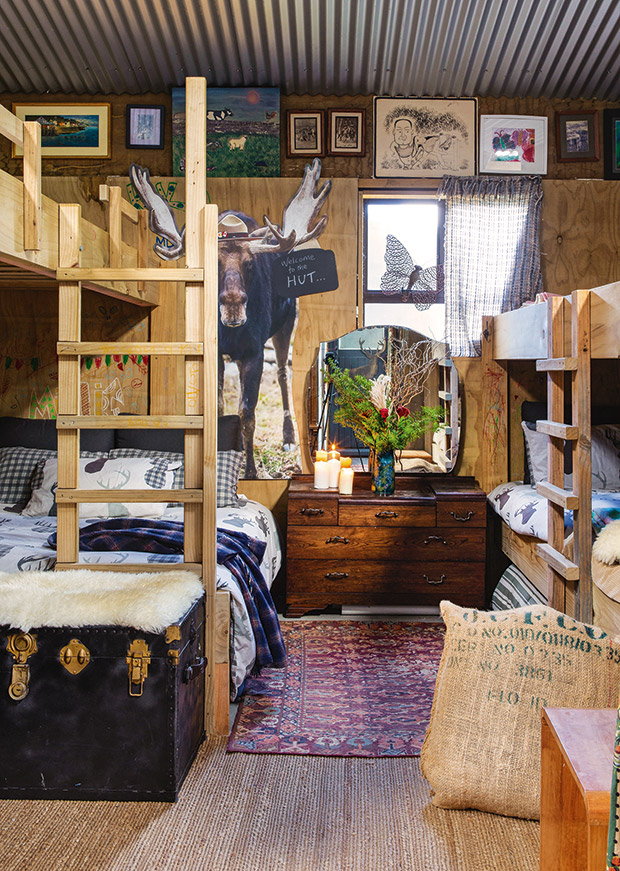
The 60-year-old dresser in the bunk room has witnessed three generations of mischief, starting with its days in the bedroom of Michael and his brother when they were boys. It is perhaps why Michael lined the eight-bed bunk room with plywood, which the grandchildren can scribble on within reason. “They can draw anything — their names, how old they are, an outline of their handprint — as long as it’s not nonsense,” says Michael.
Then, at nearly 40, he and his wife parted ways. Eighteen months of relief-farming in the Scottish Highlands and English countryside may not sound relaxing to most, but Michael is not most people.
“I saw it as an opportunity,” he says. “And I came back with a new perspective on life.” Taranaki has a way of tugging at the heartstrings of its former residents. Sure enough, when Michael met Kerry at a party 16 years ago, she was working as a mortgage broker in New Plymouth. He was back in Ōpunake.
Their courtship required a 45-minute commute, twice daily, until one day Kerry decided to take life by the horns and launch a mortgage firm. In 2006, she opened Mint Home Loan Finance; as her own boss, life never felt so flexible.
- Kerry believes it was her strong desire to live on the coast that made their home a reality. “I was doing one of my 30-day yoga journeys, and every day I manifested this home to where I could see it — I could feel it. Three months later, we moved in,” she says.
Today, on a grassy ridgeline close to the bush hut, the couple take a few quiet moments to listen to their personal hinterland. “We call it forest bathing,” says Kerry. “We just sit in the forest and take in what’s around us.” That’s not to say silence always means solitude. Given the hut’s cosy interiors and Kerry’s reputation for cooking (she makes a mean goat roast), it’s unsurprising the hut is a full house most weekends.
The pair hope to slow down further but, with their propensity for restlessness, perhaps never to a complete halt. Michael runs farming operations across 700 hectares around Taranaki with the help of his son Simon, including three dairy farms, two beef farms and a run-off. “He will never retire,” says Kerry. “He loves working.”
This is coming from a woman who, despite reducing her hours at the mortgage firm, spends her days devouring books and courses on everything from mindfulness to foraging.
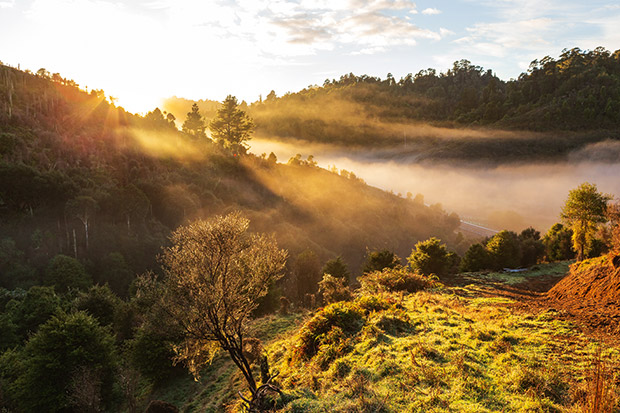
A tramp around the 202-hectare block takes more than five hours. Quick trips into the bush, usually for firewood, are made possible with several wide tracks that Michael built for their ATV.
“I have this inkling to help people learn to look after themselves, to put themselves first,” she says. When she isn’t on a two-day juice cleanse or dandelion hunting for her next caffeine-free cuppa, Kerry is organizing retreats for friends and acquaintances at the bush hut. “She is always in somebody’s ear,” says Michael, her most devout convert.
Yes, Michael and Kerry love their slower way of life. They have yet to rule out electricity for the bush retreat, but like their lifestyle, there’s no right or wrong answer to what feels right. Here, in the present, they are precisely where they need to be.
WHAT IS FOREST BATHING?
Contrary to its name, forest bathing has little to do with taking a sudsy bath in the forest. Shinrin-yoku, a phrase coined in Japan in the 1980s, translates to “taking in the forest atmosphere”. The practice involves tapping into all five senses — listening to birdsong, smelling those native trees, breathing fresh air — for what many psychologists agree will temporarily relieve stress, anxiety, and other health problems.
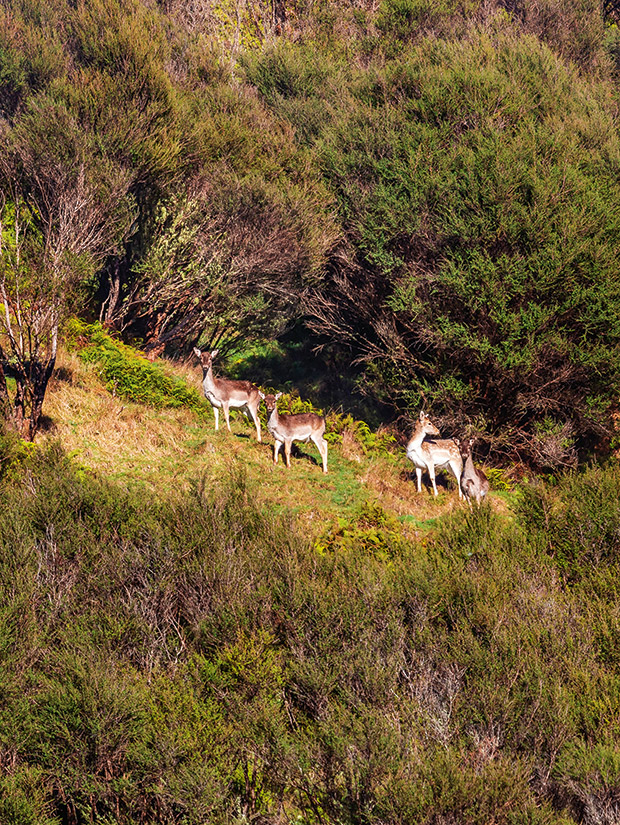
Kerry learned of the term in a mindfulness course and studied the benefits further in Li Qing’s book, Forest Bathing: How Trees Can Help You Find Health. “Forest bathing is about feeling the healing presence of the trees. It’s about walking slowly and being present,” says Kerry.
“And listening to whatever is around you,” adds Michael. “The peacefulness of the bush is similar to yoga and meditation, which we call our ‘healing medicine’. We get a similar joy from being at the hut — where we wake with the light and go to bed once it is dark.”
ON FLEXITARIANISM
This predominantly plant-based diet leaves some wiggle room for animal products. Kerry began to reduce her meat and dairy intake after attending a raw food course in Bali. It has taken her and Michael several years to adapt their way of eating. Most of their meals are made with produce grown on their half-hectare garden and orchard, which they started last year on their farm in Ōkato.
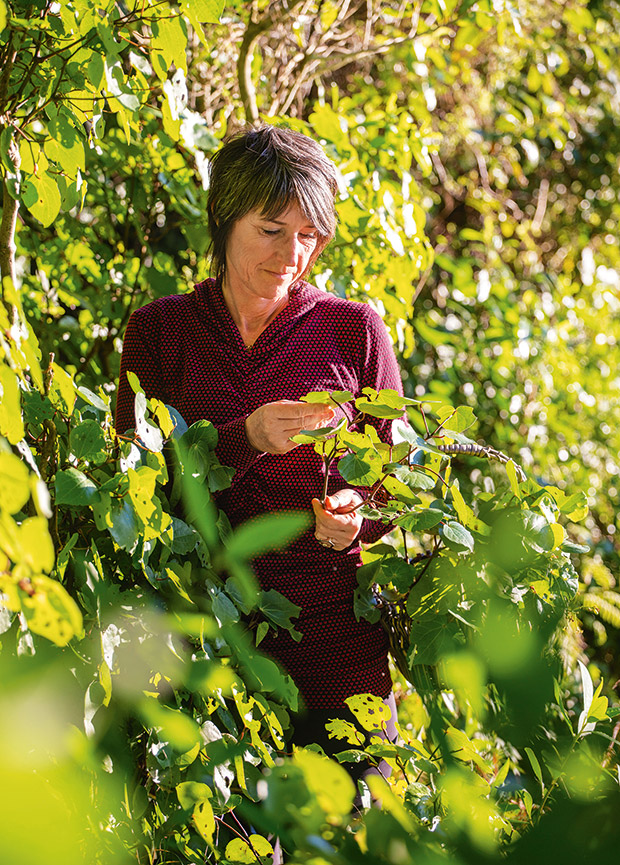
Since taking a foraging course, Kerry has enjoyed hunting for edibles she can add to raw salads, juices, or a pot of loose-leaf tea. Dandelion and kawakawa (pictured) are her favourite finds.
“It’s quite difficult to change your lifestyle instantly,” says Kerry, who earned a diploma in nutrition and life coaching during last year’s nationwide lockdown. “It’s a journey, which is why we tried cutting out something small each day.
Before you know it, you’ve changed a habit by 100 per cent.” Preservatives, processed gluten, and store-bought animal products are typically off the table at their household. What’s on the table? Fresh milk from the farm and venison that Michael hunts himself, provided it’s consumed in moderation.
“We try to keep animal products to one small portion once a day. If we have eggs for breakfast, we’ll eat plant-based for the rest of the day,” she says. But they love a good glass of wine and, when hosted by others, all bets are off. “If we go to someone’s house, we’ll eat whatever.”
MORE HERE
How the Bowden family is ensuring the survival of native flora and fauna on the Tutukaka Coast
Love this story? Subscribe now!
 This article first appeared in NZ Life & Leisure Magazine.
This article first appeared in NZ Life & Leisure Magazine.
